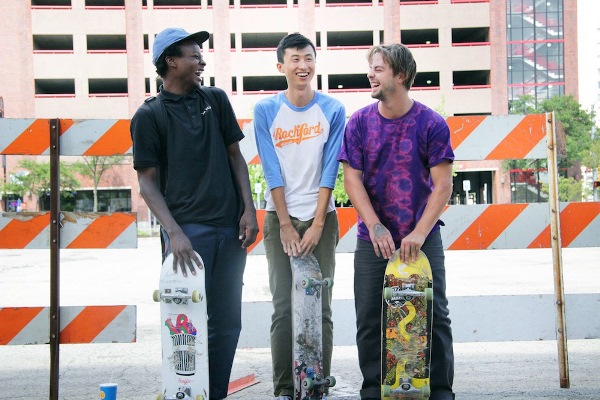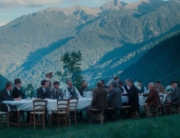![]() Skating culture is getting its close-up this year. Released earlier this month, Crystal Moselle’s Skate Kitchen focuses on a group of young women in New York City popping oillies down Manhattan’s grid. Following on that film’s heels is Bing Liu’s first feature documentary, which, based on the opening sequences, will presumably follow Liu and two friends skateboarding through Rockford, Illinois, a rusting city that could double as the setting for Roseanne.
Skating culture is getting its close-up this year. Released earlier this month, Crystal Moselle’s Skate Kitchen focuses on a group of young women in New York City popping oillies down Manhattan’s grid. Following on that film’s heels is Bing Liu’s first feature documentary, which, based on the opening sequences, will presumably follow Liu and two friends skateboarding through Rockford, Illinois, a rusting city that could double as the setting for Roseanne.
However, Minding the Gap is a classic case of bait and switch. You wouldn’t necessarily assume from the opening home videos of the guys soaring off concrete ramps that the film will delve into a complex look of masculinity and how the three skirt and/or dive into adulthood. At first, the trio plays to the camera while skateboarding in empty parking lots, but eventually each will drop his guard, whether he’s sitting on the couch guzzling a six-pack or involved in a delicate confrontation with his mother.
With the gift of gab, an effortless charm, and a mega-watt smile, Zach Mulligan, 23, is the de facto leader of the pack. As the film begins, he and his girlfriend, Nina, are having a baby, and the couple have settled down together to raise the baby boy, who will grow up on screen. Keire Johnson, still a teen, lives with his mother and her erstwhile boyfriend and is in between jobs when the film begins. Higher education of any sort is never mentioned among them. Remarkably, all three share a similar volatile family background.
All those profiled are disarmingly candid and relaxed in front of the camera, which also captures the milestones and the minutiae of the young men’s lives. Whether it’s because the director comes from a similar working-class background or stakeboards in the same circles and has gained Zach’s and Keire’s trust or is simply a good interviewer, the result is a documentary chock-full of emotional breakthroughs big and small. It’s startlingly reflective, not only because it contradicts the first impression of bro bonhomie but for the onscreen vulnerability. (Liu started working on this film at the age of 24 and finished it five years later, editing footage that covers a 12-year span.)
Liu keeps enough distance from his subjects to sensitively face ugly truths, especially regarding Zack. (At one point, Keire compares participating in the film to undergoing free therapy.) One of the reasons why the result does not come across as one-sided or judgmental is that the director turns the camera on his own family’s history of violence. Among the thoughtful questions the film raises is: Do we choose the life we lead? Perhaps in the director’s case, the answer is yes. He left Rockford for Chicago and at first studied to become an English teacher and began his filmmaker career as a jack-of-all-trades.
All three men have reacted differently to a pattern of behavior that was presumably set by their father figures—only one of whom appears on screen, but the shadow of each looms large through the personal recollections of their sons. Through his freewheeling narrative, Liu echoes a head scratcher from another recent documentary, Tim Wardle’s Three Identical Strangers: Which has the greater impact, nature vs. nurture? The film is too complex to offer any pat answers. What it does offer, though, are three tales of survivors with a distinct point of view, as they try to figure out how to navigate through their twenties, each in his own way.







Leave A Comment